2018全国卷1高考英语听力真题(含原文-答案-MP3)完整版.doc
2018高考新课标全国1卷英语试题及答案.doc

2018年普通高等学校招生全国统一考试(新课标I)英语第一部分听力(共两节,满分30分)做题时,先将答案标在试卷上。
录音内容结束后,你将有两分钟的时间将试卷上的答案转涂到答题卡上。
第一节(共5小题;每小题1.5分,满分7.5分)听下面5段对话。
每段对话后有一个小题,从题中所给的A、B、C三个选项中选出最佳选项,并标在试卷的相应位置。
听完每段对话后,你都有10秒钟的时间来回答有关小题和阅读下一小题。
每段对话仅读一遍。
例:How much is the shirt?A. £ 19. 15.B. £ 9. 18.C. £ 9. 15.答案是C。
1.What does the woman think of the movie?A.It’s amusing B.It’s exciting C.It’s disappointing2.How will Susan spend most of her time in France?A.Traveling around B.Studying at a school C.Looking after her aunt3.What are the speakers talking about?A.Going out B.Ordering drinks C.Preparing for a party4.Where are the speakers?A.In a classroom B.In a library C.In a bookstore5.What is the man going to do?A.Go on the Internet B.Make a phone call C.Take a train trip第二节(共15小题;每小题1.5分,满分22.5分)听下面5段对话或独白。
每段对话或独白后有几个小题,从题中所给的A、B、C三个选项中选出最佳选项,并标在试卷的相应位置。
2018年全国卷1高考英语听力真题(含原文,答案,MP3)
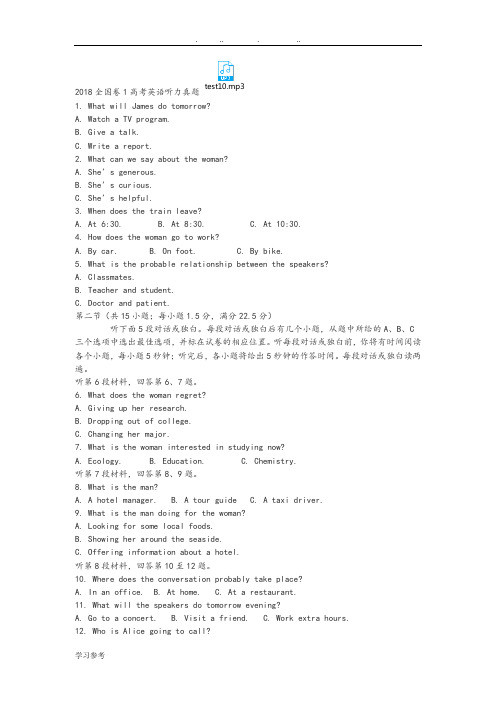
test10.mp32018全国卷1高考英语听力真题1. What will James do tomorrow?A. Watch a TV program.B. Give a talk.C. Write a report.2. What can we say about the woman?A. She’s generous.B. She’s curious.C. She’s helpful.3. When does the train leave?A. At 6:30.B. At 8:30.C. At 10:30.4. How does the woman go to work?A. By car.B. On foot.C. By bike.5. What is the probable relationship between the speakers?A. Classmates.B. Teacher and student.C. Doctor and patient.第二节(共15小题;每小题1.5分,满分22.5分)听下面5段对话或独白。
每段对话或独白后有几个小题,从题中所给的A、B、C 三个选项中选出最佳选项,并标在试卷的相应位置。
听每段对话或独白前,你将有时间阅读各个小题,每小题5秒钟;听完后,各小题将给出5秒钟的作答时间。
每段对话或独白读两遍。
听第6段材料,回答第6、7题。
6. What does the woman regret?A. Giving up her research.B. Dropping out of college.C. Changing her major.7. What is the woman interested in studying now?A. Ecology.B. Education.C. Chemistry.听第7段材料,回答第8、9题。
8. What is the man?A. A hotel manager.B. A tour guideC. A taxi driver.9. What is the man doing for the woman?A. Looking for some local foods.B. Showing her around the seaside.C. Offering information about a hotel.听第8段材料,回答第10至12题。
2018高考英语试题全国卷及答案.doc

绝密★启用前2018年普通高等学校招生全国统一考试英语第一部分:听力(共两节,满分30分)第一节(共5小题:每小题1.5分,满分7.5分)1.What is the man going to do?A.Open the window. B.Find another room. C.Go out with the woman.2.What do we know about Peter Schmidt?A.He has lost his ticket. B.He is expecting a ticket. C.He went out to buy a ticket.3.What do we know about mother and son?A.She wants to tell him the result of the game.B.She doesn’t like him to watch TV.C.She knows which team he supports.4.What are the speakers talking about?A.Exam results. B.Time for the exam. C.Change of class hours.5.What will the woman tell the man?A.Her company’s name.B.Her new address. C.Her phone number.第二节(共15小题:每小题1.5分,满分22.5分)6.What is the possible relationship between the woman and the man?A.Wife and husband. B.Doctor and patient. C.Boss and secretary 7.What does the woman think about the man?A.He is not good to the children.B.He is not telling the truth.C.He sleeps too much.8.Where does the woman want to go?A.An office. B.A fruit shop. C.A police station. 9.What does the woman have to do now?A.Wait for Mark at the crossroads.B.Walk ahead and turn right.C.Walk a little way back.10.What exactly does the man want to find out?A.What people think of the bus service.B.How many people are using the bus service.C.Which group of people use the bus service most often.11.What does the woman say about the bus service?A.The distance between bus stops is too long.B.The bus timetables are full of mistakes.C.Buses are often not on time.12.Why does the woman say her husband is fortunate?A.He often goes to work in a friend’s car.B.He doesn’t need to go shopping by bus.C.He lives close to the bus station.13.What is the probable relationship between the two speakers?A.Salesperson and customerB.Old school friendsC.Fellow workers14.What do we know about the woman?A.She is fond of her work. B.She is tired of traveling. C.She is interested in law.15.What is the man?A.A company manager. B.A salesperson. C.A lawyer.16.Why does the woman ask for the man’s address?A.To send him a book.B.To get together with him.C.To repair something at his home.17.What is the aim of the program?A.To keep trainees in shape.B.To improve public relations.C.To develop leadership skills.18.Which of the following will the trainess be doing during the program?A.Attenling lectures on managementB.Preparing reports for the company.C.Making plans for a journey.19.How long will the program last?A.8 days B.12 days C.20 days.20.If people want to join the program, what should they do after the meeting?A.Take a pre-test B.Pay for the program. C.Sign on a piece of paper.第二部分:英语知识运用(共两节,满分45分)第一节:单项填空(共15小题:每小题1分,满分15分)21.Don’t be afraid of asking for help it is needed.A.unless B.since C.although D.when22.A cook will be immediately fired if he is found in the kitchen.A.smoke B.smoking C.to smoke D.smoked23.Allen had to call a taxi because the box was to carry all the way home.A.much too heavy B.too much heavy C.heavy too much D.too heavy much24.—Sorry, Joe, I didn’t mean to…—Don’t call me “Joe”. I’m Mr Parker to you, and you forget it!A.do B.didn’t C.did D.don’t25.If anybody calls, tell them I’m out, and ask them to their name and address.A.pass B.write C.take D.leave26.The sign reads “In case of fire, break the glass and push red button.”A.不填;a B.不填;the C.the; the D.a;a27.All morning as she waited for the medical report from the doctor, hernervouseness .A.has grown B.is growing C.grew D.had grown28.A left luggage office is a place where bags be left for a short time, especially at a railway station.A.should B.can C.must D.will29.We’re going to the bookstore in John’s car. You can come with us you can meet us there later.A.but B.and C.or D.then30.Why don’t you put the meat in the fridge? It will fresh for several days.A.be stayed B.stay C.be staying D.have stayed31.News reports say peace talks between the two countries with no agreement reached.A.have broken down B.have broken out C.have broken in D.have broken up32.—There’s coffee and tea: you can have .—Thanks.A.either B.each C.one D.it33.—Susan, go and join your sister cleaning the yard.—Why ? John is sitting there doing nothing.A.him B.he C.I D.me34.The old couple have been married for 40 years and never once with each other.A.they had quarreled B.they have quarreledC.have they quarreled D.had they quarreled35.—I think you should phone Jenny and say sorry to her.— .It was her fault.A.No way B.Not possible C.No chance D.Not at all第二节:完形填空(共20小题:每小题1.5分,满分30分)阅读下面短文,掌握其大意,然后从36—55各题所给的四个选项(A、B、C和D)中,选出最佳选项。
(完整版)2018年英语全国一卷听力原文

录音稿(Text 1)W: James, you’ve been watching TV for the whole evening. What’s o n?M: It’s a science program on the origin ofthe universe. I’ll give a presentation on it in my class tomorrow.(Text 2)M: Hello, do you have The Best ofMozart?W: Um, sorry. We’ve just sold out, but we can order one for you. If you give us your number, we’ll call you when the CD arrives.(Text 3)W:We’d better be going now,or we’ll be late for the train.M:No rush.It’s8:30now.We still have two hours.(Text 4)M: I am so tired of driving all those hours to work.W: Yeah, I know what you mean. I used to drive two hours to work each way. But now I live within walking distance of my office. I don’t even need a bike.(Text 5)W: Hi Andy. I didn’t see you in Professor Smith’s class yesterday. What happened?M: Well, I had a headache, so I called him and asked for sick leave.(Text 6)W: The biggest mistake I made, uh, was leaving college in my last year, and not completing my education. So I’m thinking of going back to schoo l.M: School? To study what?W: Ecology. I’m interested in the relationship between humans and natur e.M: Cool! Is it what you studied years ago?W: No, I majored in chemistry then.(Text 7)M: Good morning, madam. I’m your guide for this trip.W: How lovely! Could you tell me about the hotel I’m going to stay at?M: Yes, of course. The Grand Hotel opened in 1990 and it sits on the seaside along the South Coast Highway. It is the most beautiful hotel here.W: That sounds great!M: And there are some restau rants outside. So at dinner time, you’d have a lot of choices.W: That’s really nice. I like to have some local foods while traveling. What about the scenery around it?M: The hotel has the best views of the Pacific Ocean.W: Oh, I think I will love this hotel.(Text 8)W: Hi, Mike.M: Hi, Alice. Nice to see you. You don’t often come here.W: I usually have fast food delivered to my office. Just came here for a change today.M: The environment here is good, clean and relatively quiet.W: Yeah, and I heard the food is tasty. By the way, are you going to the concert tomorrow evening?M: Yes. Are you?W: Yeah, Catherine was supposed to go with me, but she may have to work extra hours tomorrow. Do you know anyone who might like to go?M: No. But if you like, I can ask around. Er, Joan might want to go.W: Oh, yes, she is a great fan of classical music. I’ll give her a ring after lunch.(Text 9)W: Hi, I’ve only just arrived.M: Oh, good. Now here are the keys. Let’s go in. There are two apartments. The one f or rent is on the right. Do come in.W: Thank you. I like the carpet. The color is nice, isn’t it?M: Yes, and this apartment is in good condition. Here is your lounge.W: Where would we eat?M: There is this corner here, or you can use your kitchen. Come and see.W: The kitchen is quite small.M: Yes, but it has everything, cooker, fridge, even a dishwasher.W: And there are lots of cupboards.M: Let me show you the bedrooms. This is the smaller one.W: It’s a good size, though.M: Now come into the other bedroom. You can see the bathroom, too.W: Yes, it is very nice. But I will have to ask my friend first, and we will come together. I understand it is $800 a month.M: Yes, but a few blocks downtown would be much more expensive.W: Well, thank you. I will be in touch.(Text 10)M: Thank you very much. Thank you Dr. Johnson. Well, it is really great to be back at university again. The thing that I want to tell you today is this: education is important. When I came to the U.S., I was only thinking about being a carpenter, but I could not read the newspaper and I could not understand the news on television or movies or anything like this, so I entered the city college to take English classes for foreign students. I was very proud that I was going to a college because no one in my family ever went to any college or to any university. You know, when you are 15 years old in my country, you finish school and then you learn a trade. And that’s exactly what I did. When I was 15 years old, I learned how to be a carpenter. A year later, I came to America. Luckily, I met a very good teacher who encouraged me to take some math classes, business classes and history classes and I became a full-time college student. And today when I look back, I ’m so happy because you never know where life will take you. All of a sudden, I started making money, because I was really good at math. You know, how to work out everything with math is so important. This is something that I learned when I started my own business, which 4. B9. C 14. A 3. C 8. B 13. A 7. A 12. Bis doing really well.1. B2. C 6. B11. A 英语试题听力部分参考答案5. A10. C15. C16. B 17. C 18. B 19. C 20. A。
(完整版)2018年英语全国一卷听力原文

录音稿(Text 1)W: James, you’ve been watching TV for the whole evening. What’s on?M: It’s a science program on the origin of the universe. I’ll give a presentation on it in my class tomorrow.(Text 2)M: Hello, do you have The Best of Mozart?W: Um, sorry. We’ve just sold out, but we can order one for you. If you give us your number, we’ll call you when the CD arrives.(Text 3)W: We’d better be going now, or we’ll be late for the train.M: No rush. It’s 8:30 now. We still have two hours.(Text 4)M: I am so tired of driving all those hours to work.W: Yeah, I know what you mean. I used to drive two hours to work each way. But now I live within walking distance of my office. I don’t even need a bike.(Text 5)W: Hi Andy. I didn’t see you in Professor Smith’s class yesterday. What happened?M: Well, I had a headache, so I called him and asked for sick leave.(Text 6)W: The biggest mistake I made, uh, was leaving college in my last year, and not completing my education. So I’m thinking of going back to schoo l.M: School? To study what?W: Ecology. I’m interested in the relationship between humans and nature.M: Cool! Is it what you studied years ago?W: No, I majored in chemistry then.(Text 7)M: Good morning, madam. I’m your guide for this trip.W: How lov ely! Could you tell me about the hotel I’m going to stay at?M: Yes, of course. The Grand Hotel opened in 1990 and it sits on the seaside along the South Coast Highway. It is the most beautiful hotel here.W: That sounds great!M: And there are some restau rants outside. So at dinner time, you’d have a lot of choices.W: That’s really nice. I like to have some local foods while traveling. What about the scenery around it?M: The hotel has the best views of the Pacific Ocean.W: Oh, I think I will love this hotel.(Text 8)W: Hi, Mike.M: Hi, Alice. Nice to see you. You don’t often come here.W: I usually have fast food delivered to my office. Just came here for a change today.M: The environment here is good, clean and relatively quiet.W: Yeah, and I heard the food is tasty. By the way, are you going to the concert tomorrow evening?M: Yes. Are you?W: Yeah, Catherine was supposed to go with me, but she may have to work extra hours tomorrow. Do you know anyone who might like to go?M: No. But if you like, I can ask around. Er, Joan might want to go.W: Oh, yes, she is a great fan of classical music. I’ll give her a ring after lunch.(Text 9)W: Hi, I’ve only just arrived.M: Oh, good. Now here are the keys. Let’s go in. There are two apartments. The one f or rent is on the right. Do come in.W: Thank you. I like the carpet. The color is nice, isn’t it?M: Yes, and this apartment is in good condition. Here is your lounge.W: Where would we eat?M: There is this corner here, or you can use your kitchen. Come and see.W: The kitchen is quite small.M: Yes, but it has everything, cooker, fridge, even a dishwasher.W: And there are lots of cupboards.M: Let me show you the bedrooms. This is the smaller one.W: It’s a good size, though.M: Now come into the other bedroom. You can see the bathroom, too.W: Yes, it is very nice. But I will have to ask my friend first, and we will come together. I understand it is $800 a month.M: Yes, but a few blocks downtown would be much more expensive.W: Well, thank you. I will be in touch.(Text 10)M: Thank you very much. Thank you Dr. Johnson. Well, it is really great to be back at university again. The thing that I want to tell you today is this: education is important. When I came to the U.S., I was only thinking about being a carpenter, but I could not read the newspaper and I could not understand the news on television or movies or anything like this, so I entered the city college to take English classes for foreign students. I was very proud that I was going to a college because no one in my family ever went to any college or to any university. You know, when you are 15 years old in my country, you finish school and then you learn a trade. And that’s exactly what I did. When I was 15 years old, I learned how to be a carpenter. A year later, I came to America. Luckily, I met a very good teacher who encouraged me to take some math classes, business classes and history classes and I became a full-time college student. And today when I look back, I’m so happy because you neve r know where life will take you. All of a sudden, I started making money, because I was really good at math. You know, how to work out everything with math is so important. This is something that I learned when I started my own business, which is doing really well.英语试题听力部分参考答案1. B2. C3. C4. B5. A6. B7. A8. B9. C 10. C11. A 12. B 13. A 14. A 15. C16. B 17. C 18. B 19. C 20. A。
2018年高考英语全国卷(含1卷,2卷,3卷)真题及答案(word版)

绝密★启用前2018年普通高等学校招生全国统一考试(全国1卷)英语注意事项:1.答卷前,考生务必将自己的姓名、准考证号填写在答题卡上。
2.回答选择题时,选出每小题答案后,用铅笔把答题卡上对应题目的答案标号涂黑。
如需改动,用橡皮擦干净后,再选涂其他答案标号。
回答非选择题时,将答案写在答题卡上,写在本试卷上无效。
3.考试结束后,将本试卷和答题卡一并交回。
第一部分听力(共两节,满分30分)做题时,先将答案标在试卷上。
录音内容结束后,你将有两分钟的时间将试卷上的答案转涂到答题卡上。
第一节(共5小题;每小题1.5分,满分7.5分)听下面5段对话。
每段对话后有一个小题,从题中所给的A、B、C三个选项中选出最佳选项。
听完每段对话后,你都有10秒钟的时间来回答有关小题和阅读下一小题。
每段对话仅读一遍。
例:How much is the shirt?A.£19.15.答案是C。
1.What will James do tomorrow?B.£9.18.C.£9.15.A.Watch a TV program.B.Give a talk.C.Write a report.2.What can we say about the woman?A.She’s generous.3.When does the train leave?A.At6:30.B.She’s curious.B.At8:30.C.She’s helpful.C.At10:30.4.How does the woman go to work?A.By car.B.On foot.C.By bike.5.What is the probable relationship between the speakers?A.Classmates.B.Teacher and student.C.Doctor and patient.第二节(共15小题;每小题1.5分,满分22.5分)听下面5段对话或独白。
2018高考英语试题全国卷及答案.doc
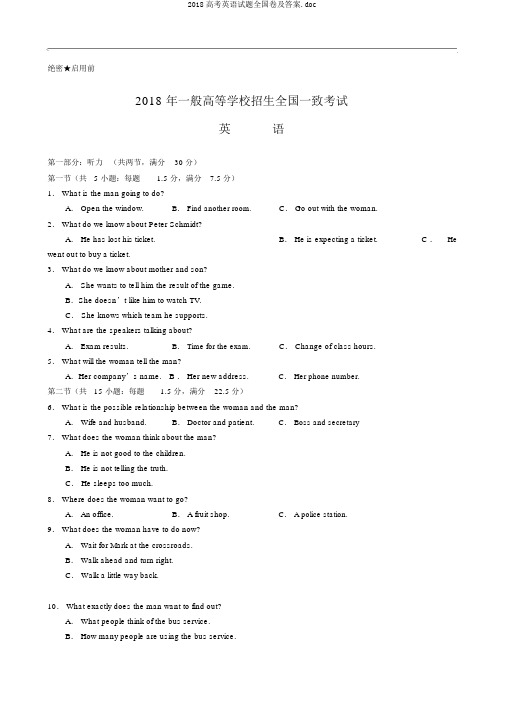
绝密★启用前2018 年一般高等学校招生全国一致考试英语第一部分:听力(共两节,满分30 分)第一节(共 5 小题:每题 1.5 分,满分7.5 分)1. What is the man going to do?A. Open the window.B. Find another room. 2. What do we know about Peter Schmidt?A. He has lost his ticket.went out to buy a ticket.3. What do we know about mother and son?A. She wants to tell him the result of the game.B.She doesn’t like him to watch TV.C. She knows which team he supports.4. What are the speakers talking about?A. Exam results.B. Time for the exam. 5. What will the woman tell the man?C. Go out with the woman.B. He is expecting a ticket. C .He C. Change of class hours.A.Her company’s name. B . Her new address.C. Her phone number.第二节(共15 小题:每题 1.5 分,满分22.5 分)6. What is the possible relationship between the woman and the man?A. Wife and husband.B. Doctor and patient.C. Boss and secretary 7. What does the woman think about the man?A. He is not good to the children.B. He is not telling the truth.C. He sleeps too much.8. Where does the woman want to go?A. An office.B. A fruit shop.C. A police station. 9. What does the woman have to do now?A. Wait for Mark at the crossroads.B. Walk ahead and turn right.C. Walk a little way back.10. What exactly does the man want to find out?A. What people think of the bus service.B. How many people are using the bus service.C. Which group of people use the bus service most often.11. What does the woman say about the bus service?A. The distance between bus stops is too long.B. The bus timetables are full of mistakes.C. Buses are often not on time.12. Why does the woman say her husband is fortunate?A.He often goes to work in a friend’s car.B.He doesn’t need to go shopping by bus.C. He lives close to the bus station.13. What is the probable relationship between the two speakers?A. Salesperson and customerB. Old school friendsC. Fellow workers14. What do we know about the woman?C.She is A. She is fond of her work.B. She is tired of traveling.interested in law.15. What is the man?A. A company manager.B. A salesperson.C. A lawyer.16. Why does the woman ask for the man’s address?A. To send him a book.B. To get together with him.C. To repair something at his home.17. What is the aim of the program?A. To keep trainees in shape.B. To improve public relations.C. To develop leadership skills.18. Which of the following will the trainess be doing during the program?A. Attenling lectures on managementB. Preparing reports for the company.C. Making plans for a journey.19. How long will the program last?A. 8 days B. 12 days C. 20 days.20. If people want to join the program, what should they do after the meeting?A. Take a pre-test B. Pay for the program.C. Sign on a piece of paper.第二部分:英语知识运用(共两节,满分45 分)第一节:单项填空(共15 小题:每题 1 分,满分15 分)21.Don’t be afraid of asking for help it is needed.A. unless B. since C. although D. when22. A cook will be immediately fired if he is found in the kitchen.A. smoke B. smoking C. to smoke D. smoked23. Allen had to call a taxi because the box was to carry all the way home.A. much too heavy B. too much heavy C. heavy too much D. too heavy much24.— Sorry, Joe, I didn’t mean to—Don’t call me“Joe”. I ’m Mr Parker to you, and you forget it!A. do B.didn ’t C. did D.don’t25.If anybody calls, tell them I’m out, and ask them to their name and address.A. pass B. write C. take D. leave26.The sign reads“In case of fire, break the glass and push redbutton.”A.不填; a B.不填; the C. the; the D. a;a27. All morning as she waited for the medical report from the doctor,her nervouseness.A. has grown B. is growing C. grew D. had grown28. A left luggage office is a place where bags be left for a short time, especially at a railway station.A. should B. can C. must D. will29.We’re going to the bookstore in John’s car. You can come with us you can meet us there later.A. but B. and C. or D. then30.Why don’t you put the meat in the fridge? It will fresh for several days.A. be stayed B. stay C. be staying D. have stayed31.Newsreports say peace talks between the two countries with no agreement reached.A. have broken down B. have broken out C. have broken in D.have broken up 32.— There’s coffee and tea: you can have.— Thanks.A. either B. each C. one D. it33.— Susan, go and join your sister cleaning the yard.— Why? John is sitting there doing nothing.A. him B. he C. I D. me34. The old couple have been married for 40 years and never once with each other.A. they had quarreled B. they have quarreledC. have they quarreled D. had they quarreled35.— I think you should phone Jenny and say sorry to her.—.It was her fault.A. No way B. Not possible C. No chance D. Not at all第二节:完形填空(共20 小题:每题 1.5 分,满分30 分)阅读下边短文,掌握其粗心,而后从36— 55 各题所给的四个选项(A、B、C 和 D)中,选出最正确选项。
(完整版)2018年高考英语全国1卷(附答案和听力原文)
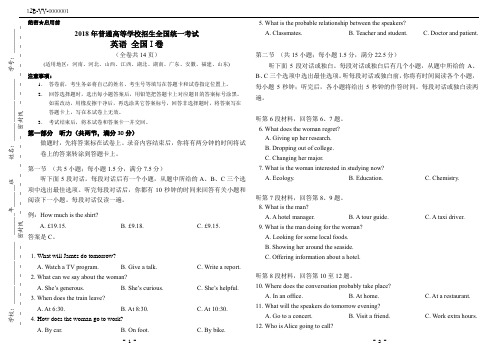
学校:____________________ _______年_______班 姓名:____________________ 学号:________- - - - - - - - - 密封线 - - - - - - - - - 密封线 - - - - - - - - -绝密★启用前2018年普通高等学校招生全国统一考试英语 全国I 卷(全卷共14页)(适用地区:河南、河北、山西、江西、湖北、湖南、广东、安徽、福建、山东) 注意事项:1.答卷前,考生务必将自己的姓名、考生号等填写在答题卡和试卷指定位置上。
2. 回答选择题时,选出每小题答案后,用铅笔把答题卡上对应题目的答案标号涂黑。
如需改动,用橡皮擦干净后,再选涂其它答案标号,回答非选择题时,将答案写在答题卡上,写在本试卷上无效。
3.考试结束后,将本试卷和答案卡一并交回。
第一部分 听力(共两节,满分30分)做题时,先将答案标在试卷上。
录音内容结束后,你将有两分钟的时间将试卷上的答案转涂到答题卡上。
第一节 (共5小题;每小题1.5分,满分7.5分)听下面5段对话。
每段对话后有一个小题,从题中所给的A 、B 、C 三个选项中选出最佳选项。
听完每段对话后,你都有10秒钟的时间来回答有关小题和阅读下一小题。
每段对话仅读一遍。
例:How much is the shirt?A. £19.15.B. £9.18.C. £9.15.答案是C 。
1. What will James do tomorrow? A. Watch a TV program. B. Give a talk. C. Write a report.2. What can we say about the woman?A. She’s generous.B. She’s curious.C. She’s helpful.3. When does the train leave? A. At 6:30. B. At 8:30. C. At 10:30.4. How does the woman go to work?A. By car.B. On foot.C. By bike.5. What is the probable relationship between the speakers?A. Classmates.B. Teacher and student.C. Doctor and patient.第二节 (共15小题;每小题1.5分,满分22.5分)听下面5段对话或独白。
2018年高考英语全国卷 I(含详细答案)
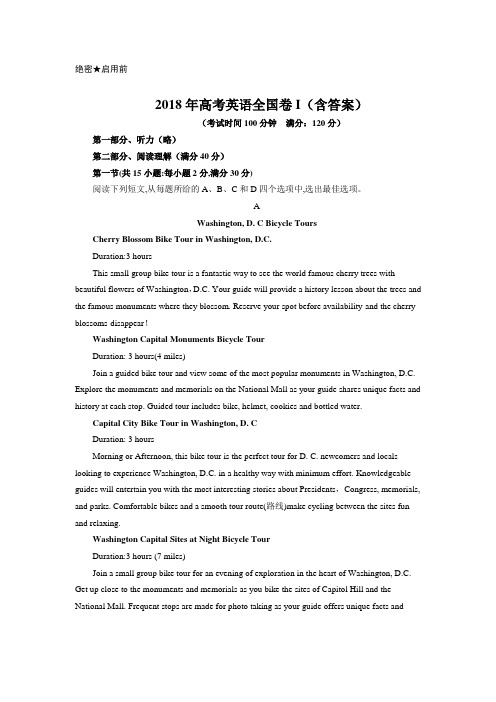
绝密★启用前2018年高考英语全国卷I(含答案)(考试时间100分钟满分:120分)第一部分、听力(略)第二部分、阅读理解(满分40分)第一节(共15小题:每小题2分,满分30分)阅读下列短文,从每题所给的A、B、C和D四个选项中,选出最佳选项。
AWashington, D. C Bicycle ToursCherry Blossom Bike Tour in Washington, D.C.Duration:3 hoursThis small group bike tour is a fantastic way to see the world famous cherry trees with beautiful flowers of Washington,D.C. Your guide will provide a history lesson about the trees and the famous monuments where they blossom. Reserve your spot before availability-and the cherry blossoms-disappear!Washington Capital Monuments Bicycle TourDuration: 3 hours(4 miles)Join a guided bike tour and view some of the most popular monuments in Washington, D.C. Explore the monuments and memorials on the National Mall as your guide shares unique facts and history at each stop. Guided tour includes bike, helmet, cookies and bottled water.Capital City Bike Tour in Washington, D. CDuration: 3 hoursMorning or Afternoon, this bike tour is the perfect tour for D. C. newcomers and locals looking to experience Washington, D.C. in a healthy way with minimum effort. Knowledgeable guides will entertain you with the most interesting stories about Presidents,Congress, memorials, and parks. Comfortable bikes and a smooth tour route(路线)make cycling between the sites fun and relaxing.Washington Capital Sites at Night Bicycle TourDuration:3 hours (7 miles)Join a small group bike tour for an evening of exploration in the heart of Washington, D.C. Get up close to the monuments and memorials as you bike the sites of Capitol Hill and the National Mall. Frequent stops are made for photo taking as your guide offers unique facts andhistory. Tour includes bike, helmet, and bottled water. All riders are equipped with reflective vests and safety lights.21.Which tour do you need to book in advance?A.Cherry Blossom Bike Tour in Washington, D.C.B.Washington Capital Monuments Bicycle Tour.C.Capital City Bike Tour in Washington,D. CD.Washington Capital Sites at Night Bicycle Tour.22. What will you do on the Capital City Bike Tour?A.Meet famous people.B.Go to a national park.C.Visit well-known museums.D.Enjoy interesting stories.23. Which of the following does the bicycle tour at night provide?A.City maps.B.Cameras.C.Meals.D.Safety lights.BGood Morning Britain's Susanna Reid is used to grilling guests on the sofa every morning,but she is cooking up a storm in her latest role - showing families how to prepare delicious and nutritious meals on a tight budget。
2018年高考全国Ⅰ卷英语试卷(含参考答案)

绝密★启用前2018年普通高等学校招生全国统一考试英语(考试时间:120分钟试卷满分:150分)注意事项:1. 答卷前,考生务必将自己的姓名、准考证号填写在答题卡上。
2. 回答选择题时,选出每小题答案后,用铅笔把答题卡上对应题目的答案标号涂黑。
如需改动,用橡皮擦干净后,再选涂其他答案标号。
回答非选择题时,将答案写在答题卡上,写在本试卷上无效。
3. 考试结束后,将本试卷和答题卡一并交回。
第一部分听力(共两节,满分30分)做题时,先将答案标在试卷上。
录音内容结束后,你将有两分钟的时间将试卷上的答案转涂到答题卡上。
第一节(共5小题;每小题1.5分,满分7.5分)听下面5段对话。
每段对话后有一个小题,从题中所给的A、B、C三个选项中选出最佳选项。
听完每段对话后,你都有10秒钟的时间来回答有关小题和阅读下一小题。
每段对话仅读一遍。
例:How much is the shirt?A. £ 19. 15.B. £ 9. 18.C. £ 9. 15.答案是C。
1.what will James do tomorrow ?A.Watch a TV program.B.Give a talk.C.Write a report.2.What can we say about the woman?A.She's generour.B.She's curious.C.She's helpful.3.When does the traif leave?A.At 6:30.B.At8:30.C.At 10:30.4.How does the wonar sRwr?mA.By car.B.On foot.C.By bike5.What is the probable relationship between the speakers?A.Classmates.B.Teacher and student.C.Doctor and patient. 第二节(共15小题;每小题1.5分,满分22.5分)听下面5段对话或独白。
2018全国卷1听力真题、原文及答案

2018全国卷1第一部分听力(共两节,满分30分)1. What will James do tomorrow?A. Watch a TV program.B. Give a talk.C. Write a report.2. What can we say about the woman?A. She’s generous.B. She’s curious.C. She’s helpful.3. When does the train leave?A. At 6:30.B. At 8:30.C. At 10:30.4. How does the woman go to work?A. By car.B. On foot.C. By bike.5. What is the probable relationship between the speakers?A. Classmates.B. Teacher and student.C. Doctor and patient.第二节(共15小题;每小题1.5分,满分22.5分)听第6段材料,回答第6、7题。
6. What does the woman regret?A. Giving up her research.B. Dropping out of college.C. Changing her major.7. What is the woman interested in studying now?A. Ecology.B. Education.C. Chemistry.听第7段材料,回答第8、9题。
8. What is the man?A. A hotel manager.B. A tour guide.C. A taxi driver.9. What is the man doing for the woman?A. Looking for some local foods.B. Showing her around the seaside.C. Offering information about a hotel.听第8段材料,回答第10至12题。
2018全国卷1高考英语听力真题(含原文-答案-MP3)
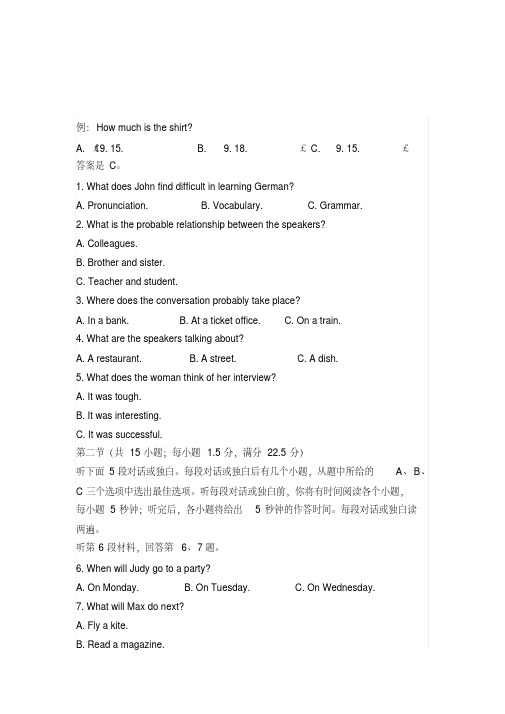
例:How much is the shirt?9. 15.9. 18. C. £A. £19. 15.B. £答案是C。
1. What does John find difficult in learning German?A. Pronunciation.B. Vocabulary.C. Grammar.2. What is the probable relationship between the speakers?A. Colleagues.B. Brother and sister.C. Teacher and student.3. Where does the conversation probably take place?A. In a bank.B. At a ticket office.C. On a train.4. What are the speakers talking about?A. A restaurant.B. A street.C. A dish.5. What does the woman think of her interview?A. It was tough.B. It was interesting.C. It was successful.第二节(共15小题;每小题 1.5分,满分22.5分)听下面5段对话或独白。
每段对话或独白后有几个小题,从题中所给的A、B、C三个选项中选出最佳选项。
听每段对话或独白前,你将有时间阅读各个小题,每小题5秒钟;听完后,各小题将给出5秒钟的作答时间。
每段对话或独白读两遍。
听第6段材料,回答第6、7题。
6. When will Judy go to a party?A. On Monday.B. On Tuesday.C. On Wednesday.7. What will Max do next?A. Fly a kite.B. Read a magazine.C. Do his homework.听第7段材料,回答第8、9题。
2018年高考真题英语全国1卷含答案

2018年高考真题英语全国1卷含答案2018年普通高等学校招生全国统一考试全国I卷英语(含参考答案)注意事项:1. 答卷前,考生务必将自己的姓名、准考证号填写在答题卡上。
2. 回答选择题时,选出每小题答案后,用铅笔把答题卡上对应题目的答案标号涂黑。
如需改动,用橡皮擦干净后,再选涂其他答案标号。
回答非选择题时,将答案写在答题卡上,写在本试卷上无效。
3. 考试结束后,将本试卷和答题卡一并交回。
第一部分听力(共两节,满分30分)做题时,先将答案标在试卷上。
录音内容结束后,你将有两分钟的时间将试卷上的答案转涂到答题卡上。
第一节(共5小题;每小题1.5分,满分7.5分)听下面5段对话。
每段对话后有一个小题,从题中所给的A、B、C三个选项中选出最佳选项。
听完每段对话后,你都有10秒钟的时间来回答有关小题和阅读下一小题。
每段对话仅读一遍。
例:How much is the shirt?A. £19. 15.B. £9. 18.C. £9. 15.答案是C。
1.What will James do tomorrow?A.Watch a TV program.B. Give a talk.C. Write a report.2.What can we say about the woman?A.She’s generous.B. She’s curious.C. She’s helpful.3.When does the train leave?A.At 6:30.B. At 8:30.C. At 10:30.4.How does the woman go to work?A.By car.B. On foot.C. By bike.5.What is the probable relationship between the speakers?A.Classmates.B.Teacher and student.C. Doctor and patient.第二节(共15小题;每小题1.5分,满分22.5分)听下面5段对话或独白。
2018年高考英语全国1卷听力答案与分析

(全国Ⅰ卷)英语听力部分第一节(共5小题;每小题1.5分,满分7.5分)听下面5段对话。
每段对话后有一个小题,从题中所给的A、B、C三个选项中选出最佳选项。
听完每段对话后,你都有10秒钟的时间来回答有关小题和阅读下一小题。
每段对话仅读一遍。
例:How much is the shirt?A. £19. 15.B. £9. 18.C. £9. 15.答案是C。
1.What will James do tomorrow?A. Watch a TV program.B. Give a talk.C. Write a report.2.What can we say about the woman?A.She’s generous.B. She’s curious.C. She’s helpful.3.When does the train leave?A.At 6:30.B. At 8:30.C. At 10:30.4.How does the woman go to work?A.By car.B. On foot.C. By bike.5.What is the probable relationship between the speakers?A.Classmates.B.Teacher and student.C. Doctor and patient.第二节(共15小题;每小题1.5分,满分22.5分)听下面5段对话或独白。
每段对话或独白后有几个小题,从题中所给的A、B、C三个选项中选出最佳选项。
听每段对话或独白前,你将有时间阅读各个小题,每小题5秒钟;听完后,各小题将给出5秒钟的作答时间。
每段对话或独白读两遍。
听第6段材料,回答第6、7题。
6. What does the woman regret?A. Giving up her research.B. Dropping out of college.C. Changing her major.7. What is the woman interested in studying now?A. Ecology.B. Education.C. Chemistry.听第7段材料,回答第8、9题。
(完整版)2018年高考英语全国1卷(附答案)
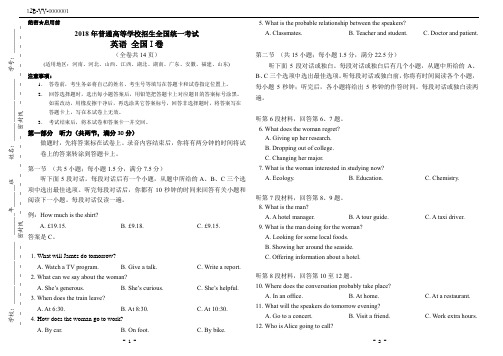
学校:____________________ _______年_______班 姓名:____________________ 学号:________- - - - - - - - - 密封线 - - - - - - - - - 密封线 - - - - - - - - -绝密★启用前2018年普通高等学校招生全国统一考试英语 全国I 卷(全卷共14页)(适用地区:河南、河北、山西、江西、湖北、湖南、广东、安徽、福建、山东) 注意事项:1.答卷前,考生务必将自己的姓名、考生号等填写在答题卡和试卷指定位置上。
2. 回答选择题时,选出每小题答案后,用铅笔把答题卡上对应题目的答案标号涂黑。
如需改动,用橡皮擦干净后,再选涂其它答案标号,回答非选择题时,将答案写在答题卡上,写在本试卷上无效。
3.考试结束后,将本试卷和答案卡一并交回。
第一部分 听力(共两节,满分30分)做题时,先将答案标在试卷上。
录音内容结束后,你将有两分钟的时间将试卷上的答案转涂到答题卡上。
第一节 (共5小题;每小题1.5分,满分7.5分)听下面5段对话。
每段对话后有一个小题,从题中所给的A 、B 、C 三个选项中选出最佳选项。
听完每段对话后,你都有10秒钟的时间来回答有关小题和阅读下一小题。
每段对话仅读一遍。
例:How much is the shirt?A. £19.15.B. £9.18.C. £9.15.答案是C 。
1. What will James do tomorrow? A. Watch a TV program. B. Give a talk. C. Write a report.2. What can we say about the woman?A. She’s generous.B. She’s curious.C. She’s helpful.3. When does the train leave? A. At 6:30. B. At 8:30. C. At 10:30.4. How does the woman go to work?A. By car.B. On foot.C. By bike.5. What is the probable relationship between the speakers?A. Classmates.B. Teacher and student.C. Doctor and patient.第二节 (共15小题;每小题1.5分,满分22.5分)听下面5段对话或独白。
2018年高考全国I卷英语听力原文+答案(5页)

2018年普通高等学校招生全国统一考试I卷英语注意事项:1.答卷前,考生务必将自己的姓名、准考证号填写在答题卡上。
2.回答选择题时,选出每小题答案后,用铅笔把答题卡上对应题目的答案标号涂黑。
如需改动,用橡皮擦干净后,再选涂其他答案标号。
回答非选择题时,将答案写在答题卡上,写在本试卷上无效。
3.考试结束后,将本试卷和答题卡一并交回。
第一部分听力(共两节,满分30分)做题时,先将答案标在试卷上。
录音内容结束后,你将有两分钟的时间将试卷上的答案转涂到答题卡上。
第一节(共5小题;每小题1.5分,满分7.5分)听下面5段对话。
每段对话后有一个小题,从题中所给的A、B、C三个选项中选出最佳选项。
听完每段对话后,你都有10秒钟的时间来回答有关小题和阅读下一小题。
每段对话仅读一遍。
例:How much is the shirt?A. £19.15.B. £9.18.C. £9.15.答案是C。
1. What will James do tomorrow?A. Watch a TV program.B. Give a talk.C. Write a report.2. What can we say about the woman?A. She’s generous.B. She’s curious.C. She’s helpful.3. When does the train leave?A. At 6:30.B. At 8:30.C. At 10:30.4. How does the wo man go to work?A. By car.B. On foot.C. By bike.5. Wh at is the probable relationship between the speakers?A. Classmates.B. Teacher and student.C. Doctor and patient.第二节(共15小题;每小题1.5分,满分22.5分)听下面5段对话或独白。
2018年高考英语全国一卷(精校+答案+听力原文)
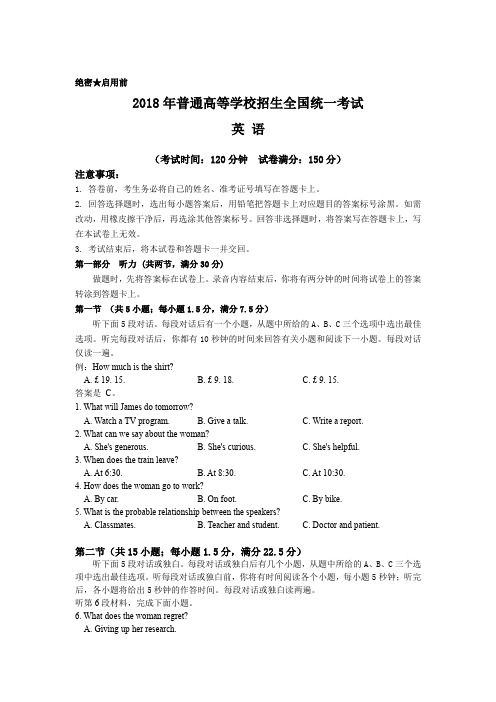
绝密★启用前2018年普通高等学校招生全国统一考试英语(考试时间:120分钟试卷满分:150分)注意事项:1. 答卷前,考生务必将自己的姓名、准考证号填写在答题卡上。
2. 回答选择题时,选出每小题答案后,用铅笔把答题卡上对应题目的答案标号涂黑。
如需改动,用橡皮擦干净后,再选涂其他答案标号。
回答非选择题时,将答案写在答题卡上,写在本试卷上无效。
3. 考试结束后,将本试卷和答题卡一并交回。
第一部分听力 (共两节,满分30分)做题时,先将答案标在试卷上。
录音内容结束后,你将有两分钟的时间将试卷上的答案转涂到答题卡上。
第一节(共5小题;每小题1.5分,满分7.5分)听下面5段对话。
每段对话后有一个小题,从题中所给的A、B、C三个选项中选出最佳选项。
听完每段对话后,你都有10秒钟的时间来回答有关小题和阅读下一小题。
每段对话仅读一遍。
例:How much is the shirt?A. £ 19. 15.B. £ 9. 18.C. £ 9. 15.答案是C。
1. What will James do tomorrow?A. Watch a TV program.B. Give a talk.C. Write a report.2. What can we say about the woman?A. She's generous.B. She's curious.C. She's helpful.3. When does the train leave?A. At 6:30.B. At 8:30.C. At 10:30.4. How does the woman go to work?A. By car.B. On foot.C. By bike.5. What is the probable relationship between the speakers?A. Classmates.B. Teacher and student.C. Doctor and patient.第二节(共15小题;每小题1.5分,满分22.5分)听下面5段对话或独白。
2018年高考英语全国1卷(附答案)

学校:____________________ _______年_______班 姓名:____________________ 学号:________- - - - - - - - - 密封线 - - - - - - - - - 密封线 - - - - - - - - -绝密★启用前2018年普通高等学校招生全国统一考试英语 全国I 卷(全卷共14页)(适用地区:河南、河北、山西、江西、湖北、湖南、广东、安徽、福建、山东) 注意事项:1.答卷前,考生务必将自己的姓名、考生号等填写在答题卡和试卷指定位置上。
2. 回答选择题时,选出每小题答案后,用铅笔把答题卡上对应题目的答案标号涂黑。
如需改动,用橡皮擦干净后,再选涂其它答案标号,回答非选择题时,将答案写在答题卡上,写在本试卷上无效。
3.考试结束后,将本试卷和答案卡一并交回。
第一部分 听力(共两节,满分30分)做题时,先将答案标在试卷上。
录音内容结束后,你将有两分钟的时间将试卷上的答案转涂到答题卡上。
第一节 (共5小题;每小题1.5分,满分7.5分)听下面5段对话。
每段对话后有一个小题,从题中所给的A 、B 、C 三个选项中选出最佳选项。
听完每段对话后,你都有10秒钟的时间来回答有关小题和阅读下一小题。
每段对话仅读一遍。
例:How much is the shirt?A. £19.15.B. £9.18.C. £9.15.答案是C 。
1. What will James do tomorrow? A. Watch a TV program. B. Give a talk. C. Write a report.2. What can we say about the woman?A. She’s generous.B. She’s curious.C. She’s helpful.3. When does the train leave? A. At 6:30. B. At 8:30. C. At 10:30.4. How does the woman go to work?A. By car.B. On foot.C. By bike.5. What is the probable relationship between the speakers?A. Classmates.B. Teacher and student.C. Doctor and patient.第二节 (共15小题;每小题1.5分,满分22.5分)听下面5段对话或独白。
- 1、下载文档前请自行甄别文档内容的完整性,平台不提供额外的编辑、内容补充、找答案等附加服务。
- 2、"仅部分预览"的文档,不可在线预览部分如存在完整性等问题,可反馈申请退款(可完整预览的文档不适用该条件!)。
- 3、如文档侵犯您的权益,请联系客服反馈,我们会尽快为您处理(人工客服工作时间:9:00-18:30)。
test10.mp32018全国卷1高考英语听力真题1. What will James do tomorrow?A. Watch a TV program.B. Give a talk.C. Write a report.2. What can we say about the woman?A. She’s generous.B. She’s curious.C. She’s helpful.3. When does the train leave?A. At 6:30.B. At 8:30.C. At 10:30.4. How does the woman go to work?A. By car.B. On foot.C. By bike.5. What is the probable relationship between the speakers?A. Classmates.B. Teacher and student.C. Doctor and patient.第二节(共15小题;每小题1.5分,满分22.5分)听下面5段对话或独白。
每段对话或独白后有几个小题,从题中所给的A、B、C三个选项中选出最佳选项,并标在试卷的相应位置。
听每段对话或独白前,你将有时间阅读各个小题,每小题5秒钟;听完后,各小题将给出5秒钟的作答时间。
每段对话或独白读两遍。
听第6段材料,回答第6、7题。
6. What does the woman regret?A. Giving up her research.B. Dropping out of college.C. Changing her major.7. What is the woman interested in studying now?A. Ecology.B. Education.C. Chemistry.听第7段材料,回答第8、9题。
8. What is the man?A. A hotel manager.B. A tour guideC. A taxi driver.9. What is the man doing for the woman?A. Looking for some local foods.B. Showing her around the seaside.C. Offering information about a hotel.听第8段材料,回答第10至12题。
10. Where does the conversation probably take place?A. In an office.B. At home.C. At a restaurant.11. What will the speakers do tomorrow evening?A. Go to a concert.B. Visit a friend.C. Work extra hours.12. Who is Alice going to call?A. Mike.B. Joan.C. Catherine.听第9段材料,回答第13至16题。
13. Why does the woman meet the man?A. To look at an apartment.B. To deliver some furniture.C. To have a meal together.14. What does the woman like about the carpet?A. Its color.B. Its design.C. Its quality.15. What does the man say about the kitchen?A. It’s a good size.B. It’s newly painted.C. It’s adequately equipped.16. What will the woman most probably do next?A. Go downtown.B. Talk with her friend.C. Make payment.听第10段材料,回答第17至20题。
17. Who is the speaker probably talking to?A. Movie fans.B. News reporters.C. College students.18. When did the speaker take English classes?A. Before he left his hometown,B. After he came to America.C. When he was 15 years old.19. How does the speaker mainly talk about?A. He’s proud.B. He’s sympathetic.C. He’s grateful.20. What does the speaker mainly talk about?A. How education shaped his life.B. How his language skills improved.C. How he managed his business well.Text 1W: James, you've been watching TV for the whole evening. What's on?M: It's a science program on the origin of the universe. I'll give a presentation on it in my class tomorrow.Text 2M: Hello, do you have "The Best of Mozart"?W: Um, sorry, we've just sold out. But we can order one for you. If you give us your number, we'll call you when the CD arrives.Text 3W: W'd better be going now, or we'll be late for the train.M: No rush. It's 8:30 now. We still have two hours.Text 4M: I am so tired of driving all those hours to work.W: Yeah. I know what you mean. I used to drive two hours to work each way. But now, I live within walking distance of my office. I don't even need a bike.Text 5W: Hi, Andy. I didn't see you in Professor Smith's class yesterday. What happened? M: Well, I had a headache. So, I called him and asked for sick leave.听第6段材料,回答第6、7题。
Text 6W: The biggest mistake I made, uh...was leaving college in my last year and not completing my education. So, I', thinking of going back to school.M: School? To study what?W: Ecology. I'm interested in the relationship between humans and nature.M: Cool. Is it what you studied years ago?M: No, I majored in chemistry then.听第7段材料,回答第8、9题。
Text 7M: Good morning, madam. I am your guide for this trip.W: How lovely! Could you tell me about the hotel I'm going to stay at?M: Yes, of course. The Grand Hotel opened in 1990. And it sits on the seaside along the South Coast Highway. It is the most beautiful hotel here.W: That sounds great.M: And there are some restaurants outside. So, at dinnertime, you'd have a lot fo choices.W: That's really nice. I like to have some local foods while traveling. What about the scenery around it?M: The hotel has the best views of the Pacific Ocean.W: Oh, I think I will love this hotel.听第8段材料,回答第10至12题。
Text 8W: Hi, Mike.M: Hi, Alice. Nice to see you. You don't often come here.W: I usually have fast food delivered to my office. Just came here for a change today.M: The environment here is good -- clean and relatively quiet.W: yeah, and I heard the food is tasty. By the way, are you going to the concert tomorrow evening?M: Yes, are you?W: Yeah.Catherine was supposed to go with me. But she may have to work extra hours tomorrow. Do you know anyone who might like to go?M: No. But if you like, I can ask around. Uh, Joan might want to go.W: Oh, yes.She's a great fan of classical music. I'll give her a ring after lunch.听第9段材料,回答第13至16题。
